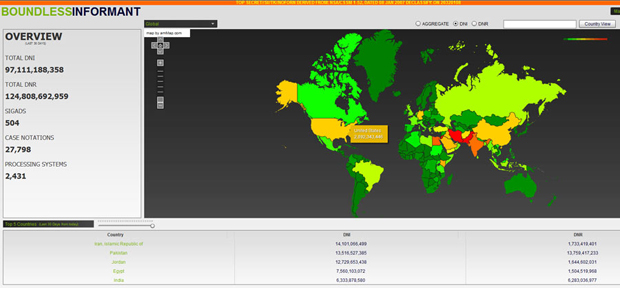Index relies entirely on the support of donors and readers to do its work.
Help us keep amplifying censored voices today.
 EU politicians demand probe into US spy claims
EU politicians demand probe into US spy claims
(more…)
While the official Chinese reaction to Edward Snowden’s Prism leaks has been muted, ordinary Chinese have been quick to point out the US’ double standard on espionage, Alice Xin Liu writes

Snapshot of Boundless Information global heat map of data collection. The color scheme ranges from green (least subjected to surveillance) through yellow and orange to red (most surveillance). (NSA)
The revelations that the United States allegedly spied on European Union diplomats marks a low in what should be a special relationship of trust between major democracies. The EU needs to remind the US that surveillance is unacceptable in the digital age.
The row was prompted by revelations published by German magazine Der Spiegel on its website this past Saturday. Relying on documents allegedly leaked by the former NSA-contractor Edward Snowden, the magazine said the NSA had surveilled EU, French, German and Italian diplomatic offices in Washington and at the UN.
Instead of reminding US authorities of the EU belief in an open and free internet, Catherine Ashton, the high representative of the EU for foreign affairs and security policy, focused on the specific press reports, calling them a “matter for concern”. The European Union needs to reiterate its well-established position that “global connectivity should not be accompanied by censorship or mass surveillance.”
But French president Francois Hollande demanded the US stop its activities “immediately.” Later, the BBC reported that Hollande threatened to derail US-EU trade pact negotiations over the bugging scandal.
Germany’s government summoned the US ambassador to explain his country’s actions. Steffen Seibert, spokeperson for Chancellor Merkel, said that Germany wants “trust restored. We will clearly say that bugging friends is unacceptable.”
French foreign minister Laurent Fabius demanded an explanation “as soon as possible” after labelling the alleged spying unacceptable.
Martin Schulz, president of the EU Parliament warned that the allegations, if true, would have a “severe impact on the relations between the EU and the US. He demanded a fuller account of the Der Spiegel reports.
Thomas Drake, a former NSA employee turned whistleblower, who was prosecuted under the US espionage act tweeted today that the alleged spying had “little to do with classic eavesdropping. Instead, it’s closer to a complete structural acquisition of data”.
Index CEO Kirsty Hughes said:
“As disagreement grows between the EU and the US over surveillance, Index on Censorship calls for the EU to take a lead in condemning mass surveillance – which the EU’s cyberstrategy already warns against. We are also calling on the US government to acknowledge that the mass surveillance of citizens’ private communications is unacceptable and a threat to both privacy and freedom of expression.”
Index on Censorship calls upon the US government to uphold the First Amendment. Whistleblowers such as Edward Snowden — as well as journalists reporting on the Prism scandal, who have come under fire — should be protected under the first amendment, not criminalised.
Index also condemns the alleged tapping of communications cables by the NSA and GCHQ, that would allow the mass surveillance of both meta data and content from individuals’ private communications.
Index CEO Kirsty Hughes said:
“The mass surveillance of citizens’ private communications is unacceptable – it both invades privacy and threatens freedom of expression. The US government cannot use the excuse of national security to justify either surveillance on this scale or the extradition of Snowden for revealing it.”